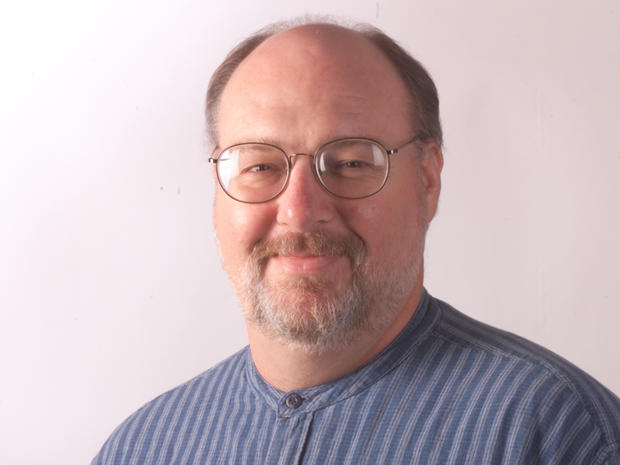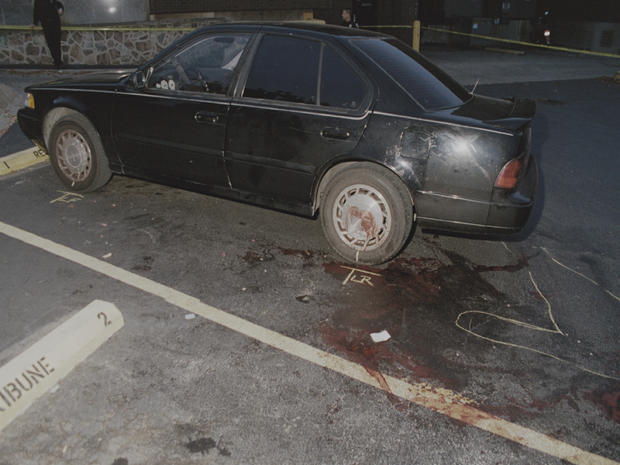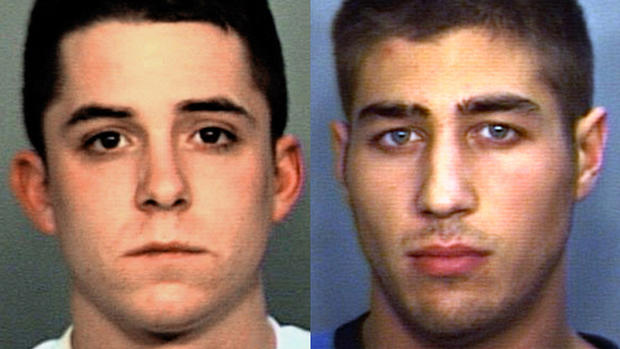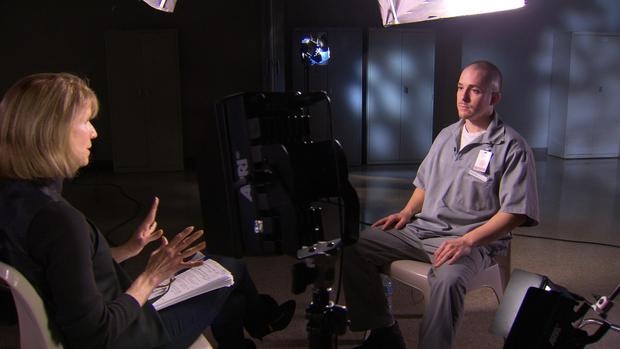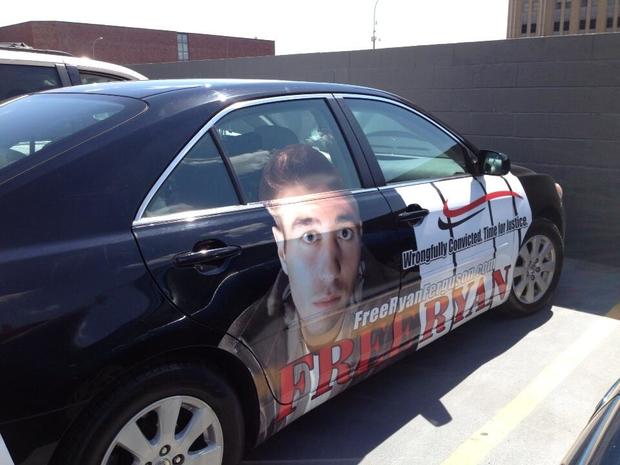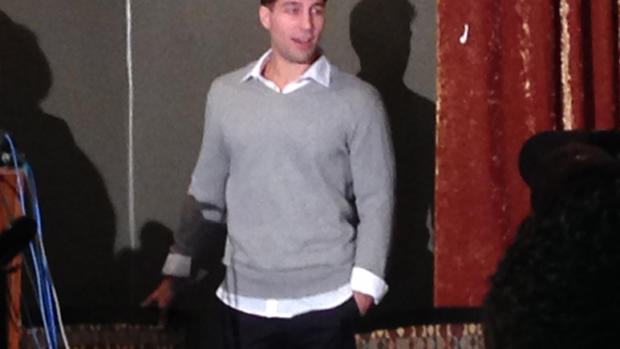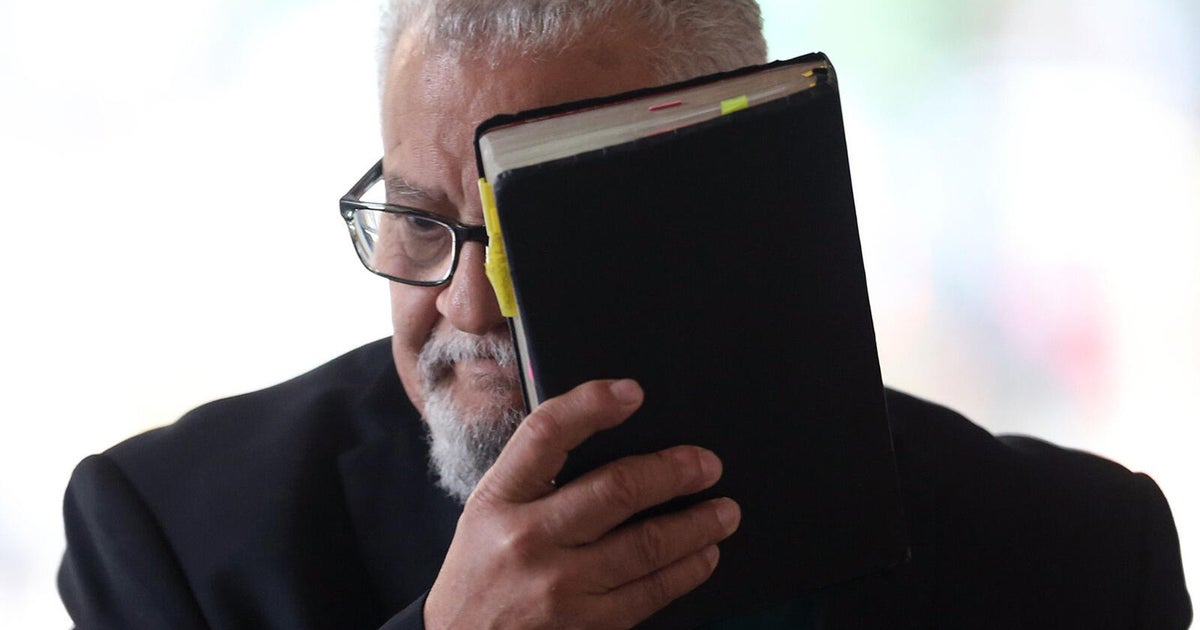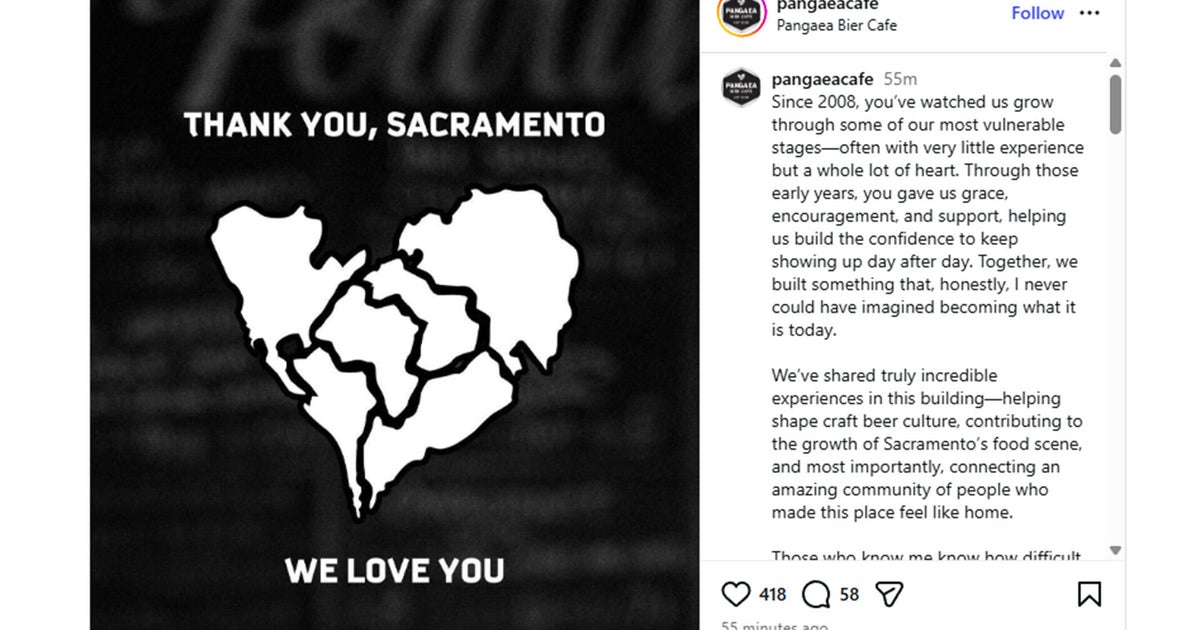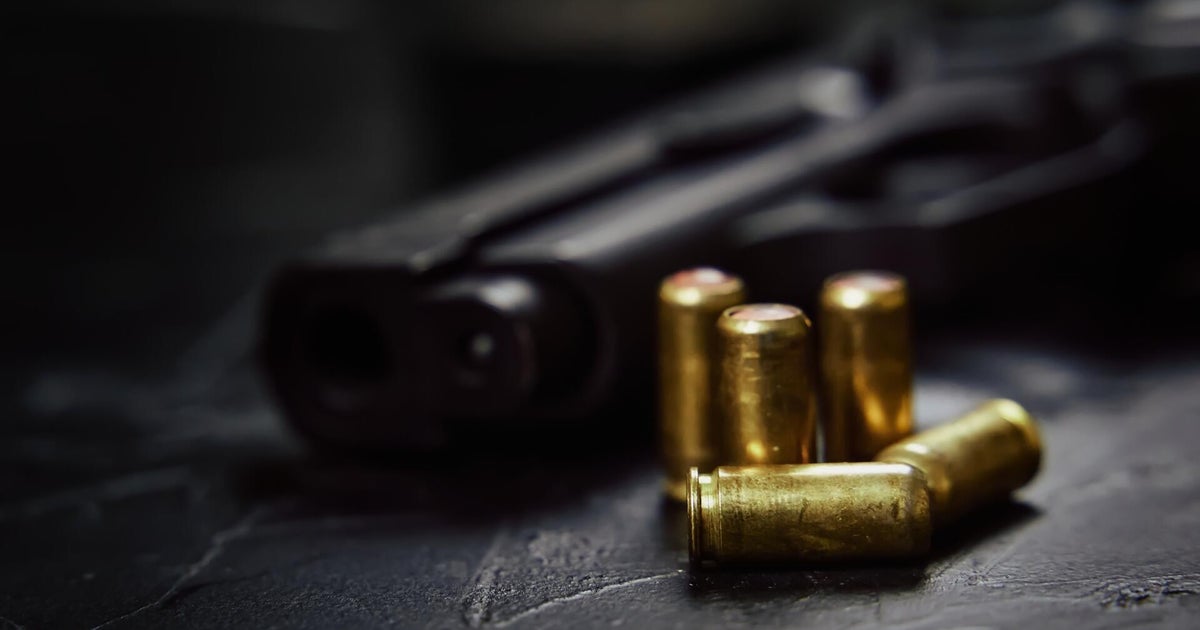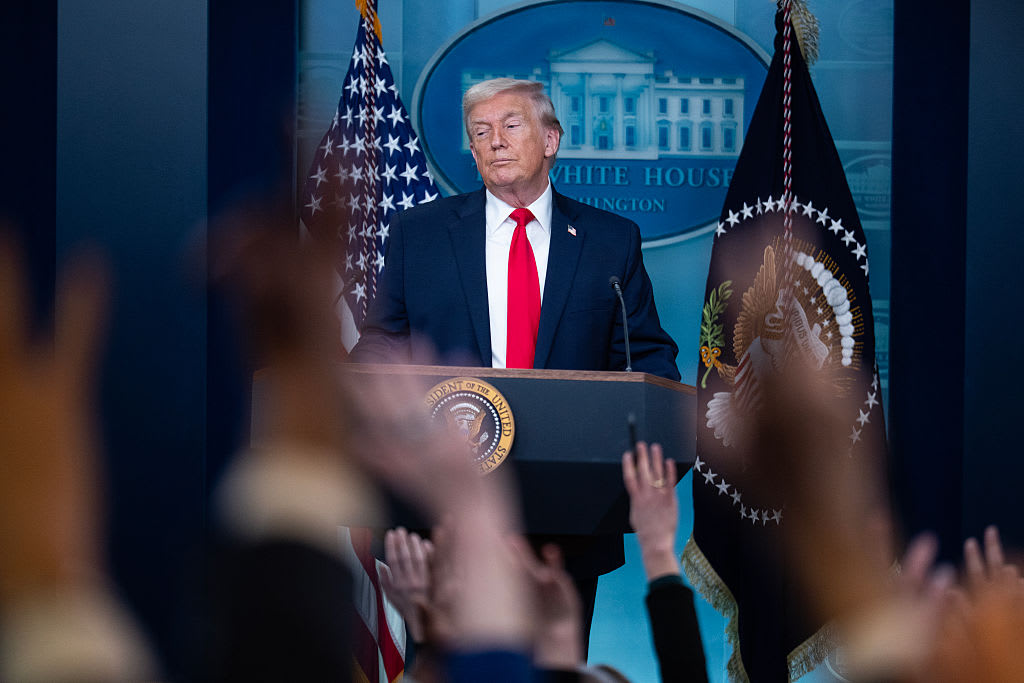Ryan Ferguson: Wrongfully Convicted
Produced by Gail Zimmerman
"48 Hours" correspondent Erin Moriarty has followed the case of Ryan Ferguson since 2005, when he went on trial for the murder of newspaper sports editor Kent Heitholt. From the beginning, there was just something not right about this case: no forensic evidence and a troubled accuser. But with a determined lawyer, Ferguson's conviction was overturned after a decade in prison. Is it the end of the story? Not yet. Not for Ryan Ferguson. And not for his accuser.
"It's an incredible feeling, I can go where I want, and do what I want, that's just something I haven't experienced in my whole adult life, pretty much," Ryan Ferguson told Moriarty a month after his release from prison.
"I get out and it's such a different world and there is so much more going on." Asked if he feels a little behind, Ferguson said, "Absolutely, there's so many things that you haven't done in a decade, and you have to learn them immediately."
He's now a free man. "I was by myself for the first time driving down a highway. That's when I actually felt free," he explained. "
Ferguson spent nearly a decade trapped inside a Missouri state prison. The circumstances that put him there are bizarre. They began, appropriately enough, on Halloween night in 2001. Kent Heitholt, the well-liked sports editor of the Columbia Daily Tribune, was murdered.
Asked how he would describe Heitholt's personality, part-time sports writer Michael Boyd told Moriarty, "Wonderful. ... wonderful guy to work with and easy to learn from. ... He was one of the most popular men I've ... known."
Boyd, who spoke with "48 Hours" in 2010, was among the handful of people working into the early morning hours with Heitholt.
Sometime after 2 a.m., Boyd recalls, he left the office. Heitholt came out a few minutes later and they chatted.
"Did he seem concerned about anything at that moment?" Moriarty asked Boyd.
"No ... just, like normal. It was just a normal night," he replied.
Shortly after Boyd drove off, two janitors came out on the loading dock and noticed Heitholt's car was still there.
One of those janitors, Shawna Ornt, said "I had that gut feeling that something was wrong."
Ornt remembers seeing two shadowy figures emerge from behind the car. One, a college-aged male, she says, stopped to speak.
"He looked me dead in the eyes and said, 'Somebody's hurt,' and he walked off casually like nothing had happened," she said.
Scared, Ornt went for help. Two reporters rushed out and found their boss by his car, in a pool of blood. Kent Heitholt had been bludgeoned and strangled.
"He's 6'4"," Boyd said. "No one's gonna mess with Kent. Who was gonna mess with Kent?"
Earlier on that same night, Ryan Ferguson was at a local bar, just blocks away from the murder scene. He and Chuck Erickson, another 17-year-old, had sneaked in together.
"We were there for approximately two hours--probably 11:30 to 1:30," Ferguson explained. "And I drove him home and went home myself."
"Did you have anything to do with the death of Kent Heitholt?" Moriarty asked Ferguson.
"Absolutely not," he replied.
Whoever did kill Kent Heitholt may have left clues. Police found hair, fingerprints and bloody shoeprints. They also spoke with the janitors. One could not provide a detailed description of the two men he saw. But the other, Shawna Ornt, did. Police released a sketch and fielded dozens of leads -- all dead ends.
"It just doesn't seem possible how -- that anybody could hurt him. And ... him bein' as nice as he was. Why?" said Boyd.
Two years passed with no breaks in the case and then, a tip came in from Crime Stoppers. Chuck Erickson told friends that he was having dream-like memories of the crime. He soon found himself in a police interrogation room:
"It's just so foggy. Like I could just be sitting here fabricating all of it," he told police.
He didn't seem to know many details, even when they took him to the crime scene:
Chuck Erickson [in police car]: Can you tell me exactly where this happened?
Detective: Parking lot is right there. Does this look familiar to you?
Chuck Erickson: I don't remember most of what happened.
But Erickson seemed eager to cooperate, especially as the questioning got aggressive:
Detective: It's you that is on this chopping block ... and I don't want to hear, "Oh, all the sudden I just think I may be fabricating all of this."
Eventually, Erickson told them what they wanted to hear. He said that he and Ryan Ferguson had run out of drinking money and decided to get more by robbing someone:
Detective: Whose idea was it?
Chuck Erickson: It was Ryan's idea.
Detective: Ryan's idea ...
Ferguson, then in college, was also rought in:
"I wasn't there. I did not do anything," Ferguson told police.
Police questioned him for hours, but he stood his ground.
"You're trying to get me to admit to something I didn't do," he told police. "I'm not lying to you man, I was not there."
In March 2004, both men were arrested and charged with murder. Erickson took a plea -- 25 years, and agreed to testify against Ferguson.
"It's beyond comprehension that Ryan could ever be in this situation," Ferguson's father, Bill, told Moriarty. "It just tears at your heart."
When Ryan Ferguson stood trial a year later, Chuck Erickson -- the once seemingly confused teen -- had become a polished witness. He had been allowed to study police reports and crime scene photos.
"I'm just doing this because I know it's the right thing to do," he told the court.
The story Erickson told was riveting and revolting:
Chuck Erickson: I hit him (demonstrates).
Prosecutor Kevin Crane: You hit him just like that?
Chuck Erickson: Well, I hit him harder than that.
Prosecutor Kevin Crane: How'd you hit him?
Chuck Erickson: I hit him like that (demonstrates).
After he hit him with a tire tool, Heitholt fell to the ground, Erickson said. Then, Ferguson turned Heitholt's belt into a weapon:
"He was down here and he had a belt, and he had his foot on his back--on the victim's back. And he was pulling up on the belt. Like this," Erickson demonstrated for the court.
Still, none of the physical evidence -- nothing -- tied Ferguson or Erickson to the scene.
Boone County District Attorney at the time, Kevin Crane, spoke to "48 Hours" in 2005.
"You're talking about a very messy crime ... and yet there's no physical evidence that connects them to the scene? Moriarty asked Crane.
If I've got physical evidence at the scene, that's great. But I don't go 'I can't prosecute this case if there is no physical evidence,'" he replied.
"Are you saying then that what most convinces you that Chuck and Ryan Ferguson killed Kent Heitholt is ... Chuck saying 'We did this?'" Moriarty asked.
"Uh-huh. Yes," Crane replied.
Shawna Ornt, the janitor who helped police create the sketch, said she couldn't identify either man.
But prosecutor Crane had a Trump card. Jerry Trump, a convicted sex offender, was the janitor who told police he couldn't describe the men he saw at the crime scene and yet at Ryan's trial:
D.A. Kevin Crane: If you see the individual ... would you point to that individual please?
Jerry Trump: Yes (points to Ryan).
Trump claimed his memory had been jogged by arrest photos he saw in the newspaper.
"I recognized the two pictures. I've seen these two faces before - at the Tribune that night Kent was killed," he testified.
With two eyewitnesses against him, Ryan Ferguson was doomed. He was found guilty and sentenced to 40 years.
Bill Ferguson is convinced his son is innocent, and shockingly, that Chuck Erickson is too.
"The police did a great job of talking somebody into a crime they did not commit," he told Moriarty.
Bill Ferguson believes Erickson was strong-armed by police into giving a false confession.
"One day Chuck's going to wake up in his cell and go, 'Oh my gosh, what have I done?'" he said.
ERICKSON'S NEW STORY
Bill Ferguson was determined to prove his son's innocence after Ryan was sent to prison in December 2005.
"I started going to the crime scene within a week of the arrest," he told Moriarty. "I'd go down around 1:30 and stay down until 3 o'clock."
Bill Ferguson spent night after night in the parking lot where sports editor Kent Heitholt was attacked and killed.
Asked how many times he's gone down to the crime scene, Bill Ferguson told Moriarty, "Forty, 50 at least."
Ryan Ferguson's appeals all failed. Then, in 2009, a new attorney came on board. Kathleen Zellner, a tough Chicago lawyer with a reputation for winning freedom for the wrongly convicted, agreed to take Ryan's case pro bono.
"What is the best way to describe Ryan Ferguson's case?" Moriarty asked Zellner.
"The analogy I think of is that he's in quicksand. And I'm trying to grab a hold of him," she replied. "... once you're convicted, the system works completely against you. ... It just becomes overwhelming to find evidence that a court will accept."
Soon after she took on the case, she got a break. Out of the blue, Ferguson received a mysterious letter from his accuser.
"He says, 'Ryan, have your lawyers come speak to me the next time that they're down here ..." Ferguson said.
Zellner quickly paid a visit.
Kathleen Zellner: May I call you Chuck?
Charles Erickson: Mr. Erickson or Charles, I don't go by Chuck.
She videotaped "Charles" Erickson as he read a prepared statement:
"Things happened much differently than I had previously stated," he read. "I could not accept in my conscience mind that I was the sole perpetrator."
Four years after his testimony put Ryan behind bars, Erickson had a change of heart and told Zellner that he had lied. Erickson said he was the one who committed the murder:
"I beat the victim, Kent Heitholt, until he was on the ground. And then I took his belt off and strangled him with it," Erickson continued reading.
Erickson even said that Ferguson tried to stop him.
"I regret now that I put an innocent man through that. He didn't deserve it," he said.
But Erickson's new story still put Ferguson at the crime scene.
"Ryan was actually the one who pushed me off the victim," Erickson said.
"He's exonerated you by saying you had nothing to do with the murder, but he has said you were there," Moriarty noted. "Isn't there a problem?"
"I believe he thinks that he committed the crime. My personal belief is that he didn't," Ferguson replied.
"You don't even think he was there either?"
"I don't think he was there. I know I wasn't there," said Ferguson.
Erickson's new story is a problem, but all that matters to attorney Kathleen Zellner is that his statement gives Ryan a new opportunity for an appeal.
"I made up what I said about Ryan being on top of the victim. I lied about him strangling the victim. That was a lie. Ryan never touched the victim," said Erickson.
"I think what's more important than the details of what he's sayin' about the crime, is he's saying repeatedly, 'I lied to the jury. I committed perjury,'" said Zellner.
And she sets out to prove that the story Erickson told at trial couldn't be true ...
"The whole story about the robbery is preposterous..." said Zellner.
She points out that Heitholt's wallet wasn't taken -- only his keys and a watch were missing.
"What did they do, take Heitholt's watch back and barter for drinks?" said Zellner.
Erickson had also claimed that he attacked Kent Heitholt with a tire tool. But that's not consistent with the evidence, says Dr. Larry Blum, a forensic pathologist hired by Zellner.
"A tire tool would not fit the injuries at all.
A heavy tire tool would have left skull fractures says Dr. Blum; the victim had none.
"There were no skull fractures associated with any of the outward injuries that were present," he said.
Dr. Blum says Heitholt's wounds are more consistent with a two-pronged tool, like a nail puller.
"In a defensive posture with the hands up," he demonstrated for Moriarty, "it would cause two parallel marks on the skin in this fashion. There were several on Mr. Heitholt's forearm, wrist area, back of the hand."
Blum estimates that the struggle lasted about six to eight minutes. That's important because Zellner says that means police overlooked a potential suspect. Michael Boyd, the part-time reporter, puts himself at the scene very close to the time the crime was reported. Boyd says he left the lot around 2:20 a.m., only six minutes before 911 was called.
"What was the last thing Kent said to you?" Moriarty asked Boyd.
"I can't remember the exact words," he replied, "but it was just more in line with, 'See you later.' And -- and I thought I would."
"What do you think happened to him?"
"I don't know," said Boyd.
In a 2010 interview, Boyd told "48 Hours" that he returned to the parking lot later that night after learning about the crime. A man, who appears to be Boyd, can be seen a photo taken at the crime scene. Boyd cooperated with detectives who interviewed him briefly. He denies having anything to do with Heitholt's murder.
"Did you fight with Kent that night? Did you have anything to do -- with this murder?" Moriarty asked.
"No. No, ma'am. No, ma'am," Boyd replied.
But Boyd, the last known person to see Heitholt alive, was never subjected to a thorough investigation.
"Did the police ever check your car, check your clothes, ask you take a polygraph?" Moriarty asked Boyd.
"No. They never asked me to do anything," he replied.
"Ask for DNA? Fingerprints?"
"No," said Boyd.
"Nothing," said Moriarty.
"Nothin', not a thing," said Boyd.
Zellner says police didn't consider Boyd a suspect because they just assumed the white men the janitors saw were the killers.
"We are going to establish that Ryan Ferguson is actually innocent of the murder of Kent Heitholt," she said.
In 2012, she was hoping to convince a new judge that the wrong man went on trial.
"...this is the whole ballgame. This is it. It's as if we're re-trying the case," said Zellner.
A DIFFERENT STORY
"How do so many people get it so wrong that you end up in prison for 40 years for something you didn't have anything to do with?" Ryan Ferguson asked. "My life was taken because a jury made a decision based off of lies."
Seven years after the original trial - after 11 failed appeals -- Ryan Ferguson is back in court asking a judge to overturn his conviction. Kathleen Zellner calls police interrogation expert Joseph Buckley to the stand.
"Be very leery of the voluntary confession. The person who walks in and says I did it. ... Because it's not typically what murderers do," Buckley testified.
Buckley tells the court that the confession of Charles Erickson, the state's star witness, is suspect because the police fed him too many details.
"The number one thing you want to do is ask open ended questions..." he said.
That's not the case here, says Buckley. That's not the case here, says Buckley, when Erickson was asked how Kent Heitholt was strangled:
Chuck Erickson [2004 interrogation]: I think it was a shirt or something.
Officer: I know it wasn't a shirt.
Chuck Erickson: Maybe a bungee cord?
Officer: We know for a fact that his belt was ripped off ... of his pants and he was strangled with his belt.
Chuck Erickson: Really?
Officer: ... does that ring a bell?
Chuck Erickson: No! Not at all.
On video, Erickson appears confused when police took him to the crime scene:
Officer: That is the parking spot where Mr. Heitholt had his car parked.
It's impossible, Buckley says, to tell what Erickson knew on his own, even though he was so convincing at trial.
"At the end of the day you don't know what you have," he explained.
"And he was pulling up on the belt ... like this," Erickson had demonstrated at Ferguson's trial.
"His story doesn't match the crime scene. That is not what happened," said Zellner.
At the hearing, Zellner calls a witness Ferguson's jurors never heard -- Michael Boyd, the last known person to see Heitholt alive:
Kathleen Zellner: No one checks either of your cars?
Michael Boyd: That's right.
Kathleen Zellner: And nobody asked you what clothes you were wearing that night?
Michael Boyd: No.
But the most important witness to Zellner is an eyewitness who did testify before.
In 2005, janitor Jerry Trump was a critical witness for the prosecution:
DA from trial: Would you point to that individual please?
Jerry Trump: Yes (points to Ryan Ferguson).
At Ferguson's trial, Trump told the jury that he had he been in jail on a sex offense at the time Ferguson and Erickson were arrested. His wife sent him the newspaper article, Trump said, and the mug shots suddenly jogged his memory.
But seven years later, at another hearing, Trump says his trial testimony was a lie:
Kathleen Zellner: When you pointed to Ryan Ferguson in the courtroom and you said that's the person you saw at The Columbia Tribune parking lot, was that true or false?
Jerry Trump: False.
The truth, he says, is what he first told the police: he could not identify either man he saw that night:
Kathleen Zellner: It was very difficult for you to admit that you'd lied.
Jerry Trump: Absolutely. Extremely difficult.
Trump claimed it was the prosecutor, Kevin Crane, who showed him that newspaper.
"He said, 'It would be very helpful if you can help us with this... by identifying them," Trump explained in court.
He says Crane assured him that they had the right men.
"I felt very intimidated, 'cause the only thing I wanted to do, at that point, was to do the right thing. I'd been in enough trouble," Trump testified.
But after the trial, Trump says he was haunted by what he did. This time, when he points to Ryan, it's for a very different reason.
"I'd like to have forgiveness from Ryan and his -- and his family," an emotional Trump said on the stand.
"I couldn't even move. I could hardly think. But I did feel sorry for the man because you can just see the pain that he's been dealing with," Ferguson said of Trump's statement.
"He has a conscience" Zellner said of Trump. "He was really evaluating his life. And he felt that what he'd done was terrible."
Kevin Crane, now a judge, also takes the stand and he denies trying to influence Trump's testimony in any way:
Kathleen Zellner: Did you show Mr. Trump this article that day?
Kevin Crane: Absolutely not.
Crane claims Trump volunteered the information.
"Mr. Trump's in the doorway of my office," Crane said. "And unsolicited, very soon into the conversation, he said, 'I think I can identify these guys.'"
But then, there's a surprising revelation -- something Ferguson's team had never heard of before and it comes from Crane's own investigator, William Haws:
Q: Where did he get the article?
William Haws: He said his wife sent it to him ...
As it turns out, Haws tried to confirm Trump's story by speaking with Trump's wife.
"I explained to her that Jerry said she sent him the article, she said, 'I don't remember that and I really don't want to talk to you about this,'" he explained.
That's crucial evidence, says Kathleen Zellner, that the prosecution never told the defense.
Zellner says that if Ryan's lawyers had known that at trial, they could have argued Trump was lying.
Finally, the court is about to hear from another witness whose story has changed again and again.
What will Charles Erickson say to this judge?
"... logically nobody should believe anything that I say because I'm a liar," he said.
ERICKSON TAKES THE STAND
When Charles Erickson takes the stand at Ryan Ferguson's 2012 hearing, it is the first time since the trial that the men come face to face in court.
"When he walked in it was a very strange feeling, seeing him again," Ferguson said Told Moriarty. "I know that he chose to lie about me, so it kinda hurts that a person would do that for reasons that I don't understand."
"It was good to see that he's ... doin' all right and that he's alive," Erickson said of seeing Ferguson.
Erickson was in a Missouri prison serving his 25-year sentence when "48 Hours" first spoke with him in January 2013. He told us then that his entire testimony at Ryan Ferguson's trial was fabricated.
"The reason that I felt I needed to lie and make things up is because I couldn't remember anything," he told Moriarty.
Despite everything he said before, Erickson now says he has never had any memory of what happened the night Kent Heitholt was killed - at least not after he sneaked into that bar.
"Do you remember leaving the club?" Moriarty asked Erickson.
"No, I don't remember leavin' - at all," he replied.
"Do you -- remember driving home?"
"No, I don't even know if Ryan took me home," said Erickson.
"What's the next thing you remember?"
"I remember wakin' up in the morning and havin' to go to school," he said.
Erickson's use of drugs and alcohol as a teen is well documented. On that particular night, he says, along with abusing cocaine and the prescription drug Adderall, he had consumed a large amount of alcohol.
"I remember drinking green drinks, I remembered being pretty intoxicated," Erickson testified in 2012.
"Did you find any blood on your clothing when you woke up?" Moriarty asked Erickson.
"No. I had no blood on my clothing. I had no injuries. I had no murder weapons," he replied.
"Was there anything through that day that made you think that you had been involved in a horrific murder?" Moriarty asked.
"No," said Erickson.
And yet a full two years later after reading an article about the unsolved murder, Erickson suddenly became convinced -- almost obsessed with the idea -- that he might have done something terrible during his blackout.
"I read there were two white guys there -- two white kids. I saw the picture in the paper which is a sketch ... and it looked like me," Erickson said. "I just realized I couldn't remember what I'd done that night."
"Help me out with this," Moriarty said. "Why would you suddenly think -- just because you couldn't remember what you had done that night that you might be involved in a murder?"
"... I'm tryin' to think about that night when I was very intoxicated. There's a lot of drugs in between then and when I'm trying to think about it. I'm high on something," Erickson said. "I was probably paranoid because of all the drugs that I was doin'."
When Erickson ran into Ryan at a party, he told him about those strange thoughts.
"Maybe he thought I was crazy anyway. 'But man, we -- you're trippin' we didn't do that. You know, you didn't kill that guy,'" said Erickson.
"Why didn't you believe him when Ryan said, 'We didn't do this?'" Moriarty asked.
"It's not that I didn't believe him,' Erickson said. "I'm thinking well, maybe he knows I don't remember, and he doesn't wanna tell me because he thinks I gonna say something or he thinks I'm gonna flip out or he thinks I'm gonna kill him because he was a witness. I don't know."
It was an anonymous call to police that landed Erickson, high on marijuana he says, in that police interrogation room.
Erickson spoke to detectives hoping for answers.
"I don't remember a lot of this," he told police during his 2004 interrogation. "I think I just blacked out."
Instead, says attorney Kathleen Zellner, they were focused on finally closing the case.
"Here's a kid that, for whatever reason, is trying to involve himself in this," Zellner told Moriarty.
Detective: I'm going to be point blank with you, pal ... I'm going to start talking and you're going to start listening ...
"... and they've got the perfect person to manipulate, bully, mold his testimony," Zellner continued, "because he's a kid with a drug and alcohol problem. ..."And so they start workin' on him."
Detective: Do you understand me?
Chuck Erickson: Yes.
Detective: You better start thinking very clearly.
"They take advantage of him and they scare him," said Zellner.
Erickson began to panic, he says, when detectives claimed that Ferguson was about to turn on him and Erickson would take the blame:
Detective: Ryan's going to talk. Don't let Ryan tell the story for you.
"I was scared that he was putting it on me, and I created this story basically to cover myself," Erickson said. "And I did lie. I lied."
Erickson stuck with the story, and even began to believe it, he says, when he was shown police reports like one which states that a schoolmate, Dallas Mallory, saw him that night.
"At one point Dallas Mallory is saying ... He saw me fleein' the scene. ...and that Ryan was with me," said Erickson.
But in 2005, Dallas Mallory told "48 Hours" he didn't see Erickson at the scene, although police pressured him to say that he did.
"I was in tears," Mallory said.
"Tears?" said Moriarty.
"'Cuz I didn't know what was going on. They were saying that I could be charged with murder, 'cuz I was with him. And I was not with him at all," he replied.
Attorney Zellner says Erickson was duped by investigators.
"He didn't realize that Dallas Mallory had said, 'No, I was pressured by the police into saying you were there.' He didn't realize that Ryan was not plotting against him. So he was completely misled about the evidence prior to entering his guilty plea," she said.
Four years after the trial, a sober Erickson began to have serious doubts about what he did.
"... it's really hard to-- to-- admit that you r-- you know, really screwed somebody over," he said.
That's why, he says, he spoke to Ferguson's lawyer in 2009 and took full responsibility for the crime.
"I could not accept in my conscience mind that I was the sole perpetrator and aggressor," Erickson had stated at the time.
But even that was a lie, he says.
"I thought that the only way I could help Ryan ... was to say that I'd done everything. He didn't know what I was gonna do. He tried to stop me," said Erickson.
Erickson says the real truth is what he tells the court at the hearing in April 2012 -- that he doesn't know what happened that Halloween night and never has.
"And -- I don't wanna die, you know, knowin' that - I -- I did the wrong thing," he said.
In cross examination, a lawyer for the state challenges Erickson's credibility:
Q: You've testified in trial, in front of a jury, under oath, and said you did it.
Charles Erickson: Yeah, because I was -- I had to save my ass.
Q: Are you saying then you remembered and now you don't today?
Charles Erickson: No, I'm just good at makin' stuff up.
"Am I telling the truth now? I'm telling you the truth now. Do I expect you to believe it? No, I don't expect you to believe it," said Erickson.
More important, this judge doesn't believe him. He rules that Erickson was more credible at the original trial and upholds Ryan Ferguson's conviction.
"It just really made me feel like, 'There is no hope for Ryan,'" said Erickson.
That was 2012. A lot has changed since then.
"I feel that there is some light at the end of the tunnel," he told Moriarty, "and it feels really, really good."
THE MYSTERY CONTINUES
With Ryan Ferguson still behind bars, his father, Bill, takes to the road to tell his story.
"You just cannot give up. You just have to keep going," Bill Ferguson said from behind the wheel of his car that is wrapped with a photo of his son and the words "Free Ryan Ferguson". "I've driven 9,000 miles in 21 days ... doing this is like a 4-wheel billboard."
He creates a "Free Ryan Ferguson" Facebook page where supporters pose with signs.
"We have thousands and thousands of supporters all over the co -- all over the world," said Bill.
"He continues to have great ideas and continues to do everything he can to prove my innocence," said Ryan.
Ryan is hanging his hopes on yet another hearing, this one in a Missouri appellate court.
In September 2013, attorney Kathleen Zellner argues for his freedom:
Kathleen Zellner: There is no evidence left in this case.
Judge: So let's look at the legal issues.
The judges, well versed on the case, seem particularly concerned about the evidence used against Ferguson at trial -- specifically, how janitor Jerry Trump was suddenly able to identify Ryan:
Judge Cynthia Martin: Mr. Trump ... had come to an awakening of sorts... Based upon a newspaper article that his wife had purportedly sent him in prison ... Generally, I've got it right?
Kathleen Zellner: Absolutely.
But prosecutors knew that Trump's wife couldn't recall ever sending that newspaper and kept that crucial fact from the defense.
"I believe that there was an effort -- to conceal anything exculpatory that might have led the defense to question the identification," Zellner told the court.
"If you cannot get the conviction vacated at that stage, you're at the end of the road," Zellner told Moriarty.
For two months, Ryan's parents anxiously look for a sign of a decision.
"The waiting is agonizing," said Leslie Ferguson.
Then, on Nov. 5, 2013, the decision is unanimous. The judges rule that Ryan Ferguson did not get a fair trial and set aside his conviction.
"It's been a long, long road," said Bill Ferguson.
"48 Hours" spoke with Ryan shortly after he got the news.
"You are, as you stand here, an innocent man," said Moriarty.
"I'm an innocent man and I hope the whole world can see it now," Ferguson replied. "It's kind of overwhelming, but at the same time I don't feel it yet ... because you're still surrounded by fences and guards and everything.
"I think once I'm with my family, that's when it will probably hit me," he continued.
Nearly 10 years after he was picked up for questioning, Ryan Ferguson is finally free. The state has decided not to retry him.
"I thought about that moment so many times in the past, actually walking out and getting out of prison ... while I was in the moment, I almost couldn't feel anything," he explained, "and then we get out and drive away from the prison and I'm thinking, 'this is what it's like to drive, with my family on the road.'"
"My first glimpse of him ... he just looked so vulnerable, so small. I mean, he just reminded me of, you know, when he was a little kid," Bill Ferguson said. "And I just remember standing there, just on the verge of tears, not being able to control my emotions in that moment.
"The amazing thing is that ... one hour later, he is doin' a press conference," he continued.
"To get charged with a crime you didn't commit is incredibly easy, to get out of prison, it takes an army" - Ryan Ferguson to the press
"...and he was just so cool and -- and so--articulate," said the proud father of his son.
"You're even emotional thinkin' about it," Moriarty commented to Bill Ferguson.
"I am. I am. I am. Yeah," he replied.
Asked if it is over, Zellner told Moriarty, "No. Not at all. It's not over. Because he lost 10 years of his life."
Ferguson has filed a civil suit against the police and several investigators. "There has to be accountability for all of these people," she said.
Ryan Ferguson may be free, but the mystery remains: who killed Kent Heitholt?
"I know that Charles Erickson is absolutely innocent," Zellner said. "When you have innocent people locked up, you've got the murderer still on the street... They need to find the real killer."
"What evidence exists today that could be tested or examined that might lead to solving the case?" Moriarty asked Zellner.
"There's seven unidentified prints on the car," she replied. "...there's a big palm print and there's a thumb print on those papers that have Mr. Heitholt's blood on them and ...They have people that were right there that they haven't eliminated."
People like Michael Boyd, says Zellner, the last known person to see the victim alive. Boyd has always denied any involvement, but even the appellate judges raised questions abut Boyd's past testimony.
In November 2013, police issued a statement, saying they will "follow up on any new leads or information", but how can they investigate in earnest while Charles Erickson is still serving time for Kent Heitholt's murder?
"You haven't heard from the Columbia police?" Moriarty asked Erickson. "You haven't heard from any investigators taking a new look at the case?"
"No," he replied.
Three months after Ferguson left prison, "48 Hours" sat down again with Charles Erickson. Erickson would like to withdraw his guilty plea. After all, the only evidence linking him to the crime is his own confession, which he says is a false confession.
"Charles, as you sit here today, do you think you had anything to do what the death of Kent Heitholt?" Moriarty asked.
"No. No, I don't," he replied.
"But you know, you have admitted that you lied at trial. Why should people believe you now?" Moriarty asked.
"All I can ask is to look at the evidence," Erickson replied. "They should look at the first interrogation tape. ... And you can see how it happened."
And while he says he still has no memory of the night, the unidentified prints are proof that neither he nor Ryan Ferguson had anything to do with the murder.
"It was really easy for the police and the prosecutors to manipulate me," Erickson told Moriarty. "I'm angry. I'm angry at myself. I feel like I've been played for a fool ..."
"What should happen to you now?" Moriarty asked Erickson.
"I feel like I should be released from prison," he replied. "I try just to take it day by day ... and work on improving myself and educating myself, and work on tryin' to get outta prison."
It's not going to be easy. Erickson may have waited too long to file for some legal procedures. Still, he has the support of a dedicated Facebook page and even Ryan Ferguson.
"I know he had nothing to do with this crime. I took him home, he went to sleep and there's just no way," said Ferguson.
But Erickson knows that some people may never forgive him.
"I apologize, obviously. ...I don't think that there is anything I can say to console anybody," he told Moriarty. "I have given the Heitholt family false hope. ... And so I can't imagine the pain that I have caused them."
"You have a family too. Has it been tough on your family?" Moriarty asked.
Incredibly. Incredibly," Erickson replied. "My mom, my dad, they come and see me whenever they can ... I'm just glad that they support me. And they want me to get out."
"What do you want people to know about you?" Moriarty asked Erickson.
"What do I want people to know about me? I want people to know that I'm not crazy. I want people to know that -- sorta just the whole story," he said.
The best part, he says, is that Ryan Ferguson is no longer behind bars.
"It feels good, knowin' that he's out. And it's -- really feels like my load has been lightened," Erickson said, "and I hope he's able to do the things he wants to do."
Is Ferguson bitter?
"I am bitter. But I try take that negativity and turn it into a positive action," he told Moriarty.
"I still have to pinch myself every day," Leslie Ferguson said. "And I just love being able to watch him doing normal things."
Ferguson now has a girlfriend, Myka Cain, a key supporter who he got to know through letters while he was still in prison.
"I have helped with the Facebook page and the website," she said. "It was kind of shocking at first when he got out because it was chaos."
"She's there on a day-to-day basis. Like, 'Here's how you turn on your phone,'" Ferguson said. "Here's when you need to get up, here's how you get on a airplane.' So it's incredible She's been amazing, and I'm so grateful to her."
"We're just excited to ... get some normalcy in our life. It'll be a new beginning for both of us," added Cain.
Ferguson has been making public appearances, He and Cain have moved far from Missouri, where his case is still controversial. The challenge is putting the painful past far behind.
"... Nothing feels quite right. You always kind of feel like an outcast. You always feel like people judge you," Ferguson said. "You just have to accept that and move forward in your own life. But it's just, it's hard."
If Charles Erickson's appeals fail, his earliest parole date is March 2020.

